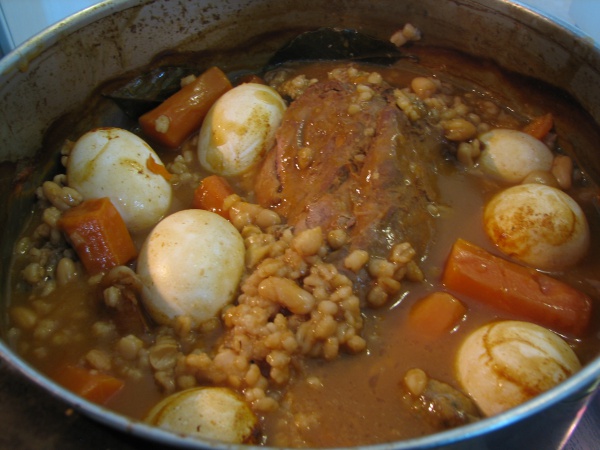Facts About Cholent
Cholent, also known as hamin, is a cherished Jewish stew traditionally simmered overnight for at least 12 hours, enjoyed for lunch on Shabbat. This dish was conceived to adhere to Jewish laws that prohibit cooking on the Sabbath. The pot is brought to a boil before Shabbat begins and then kept warm using various methods until the next day.
Cholent varies based on its origin, either Ashkenazi or Sephardi. Ashkenazi cholent typically includes meat, potatoes, beans, and barley, while Sephardi hamin might feature rice, wheat kernels, chickpeas, and chicken, often with whole eggs cooked in their shells. The slow cooking process allows the flavors to blend, giving cholent its distinct and comforting taste.
The word "cholent" has etymological roots in Latin, Old French, and Hebrew. The term "hamin" comes from the Hebrew word for "hot." Across different regions, this dish goes by various names and versions, such as "sakhina" and "dafina" in Morocco and "adafina" in Spain and the Maghreb.
Cholent is a staple in Jewish households, served as the main course for the midday meal on Saturdays. It's also a popular dish at synagogue celebrations and other Jewish events. Preparation must be completed before Shabbat begins, as cooking is forbidden on this day.
Cholent traces its history back to the 12th century, holding cultural significance in Jewish communities worldwide. Different regions have their own interpretations of cholent, such as "schalet" in Germany and the Netherlands, "sólet" in Hungary, and "s’hina" in Morocco.
Recipes for Ashkenazi cholent and Sephardi hamin vary based on local preferences. Common ingredients include beans, barley, beef, onions, and potatoes. Some variations use alternative meats like chicken and turkey. Sephardi hamin often features stuffed vegetables, spices like cumin and hot peppers, and whole eggs.
"Haminados" are whole eggs cooked in cholent that turn brown during the slow-cooking process. Cholent has even found its way into literature, with mentions in poems by Heinrich Heine and various novels.

 Egypt
Egypt